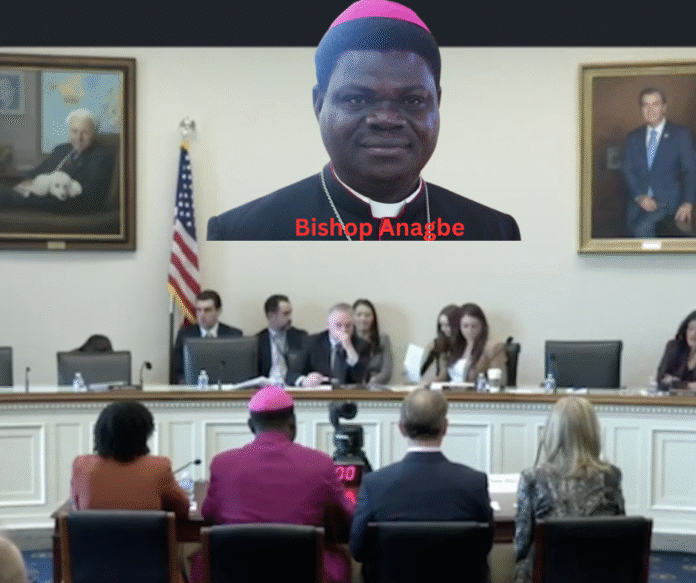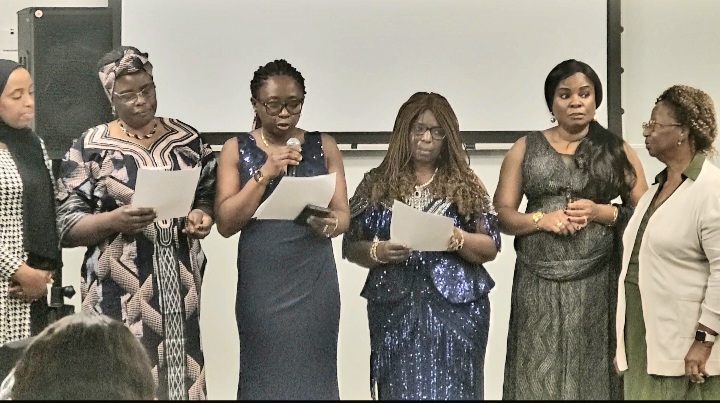Inside the spiraling chaos: Bishops cry foul in Washington, Abuja pushes back, and millions are caught in the crossfire of terror, banditry, and doubt.
Abuja/Washington D.C. – When Bishop Wilfred Anagbe of Makurdi Diocese and Rev. Fr. Remigius Ihyula stood before a United States Congressional hearing, their voices carried the weight of years of bloodshed from Nigeria’s Middle Belt. They spoke of relentless attacks, religious persecution, and a government seemingly unable, or perhaps unwilling, to protect its citizens. Back home, the Nigerian government was swift to react, dismissing their testimonies as misrepresentations that oversimplified a “deeply complex” national challenge. Yet, reports soon surfaced that the clergymen faced threats, allegedly stemming from government sources, for daring to voice their grim reality on an international stage.
But in a press statement signed by the spokesperson for the Ministry of Foreign Affairs, Kimiebi Imomotimi Ebienfa, the government expressed concern regarding publication by the United States Embassy, Abuja, regarding the security situation in Nigeria and the testimonies provided by Bishop Wilfred Anagbe and Rev. Fr. Remigius Ihyula, on the unfortunate alleged threats that have arisen as a result of their testimonies at the U.S. Congressional Hearing on Religious Persecution in Nigeria. “The government has consistently taken decisive actions, including deploying security forces to areas affected by communal violence, engaging in peace-building efforts between farmers and herders, strengthening intelligence operations to track down criminal elements, and implementing policies to address root causes, including land use reforms and economic development initiatives,” it said.
Did the Bishops misrepresent the facts? The data paints a harrowing picture that lends credence to their alarm. Nigeria, Africa’s most populous nation, is caught in a maelstrom of violence engulfing vast swathes of its territory, particularly in the North and Middle Belt. The culprits are many: the ruthless Islamist insurgents of Boko Haram and its offshoot ISWAP, roving armies of heavily armed “bandits” engaged in industrial-scale kidnapping and plunder, and bloody clashes between nomadic Fulani herders and settled farming communities, often tinged with ethnic and religious undertones. It seems the herders act with impunity, committing violence across various regions of the country. As they move their cattle, they often trespass onto farms, harvesting crops to feed their cattle. Those who confront them face dire consequences, including murder, sexual violence against women, and the destruction of homes.
The Body Count and the Disappeared
The human cost is staggering and cuts across all lines, but religious figures and communities have been particularly vulnerable.
- Clergy Under Siege: Between 2015 and early 2025, a staggering 145 Catholic priests were kidnapped in Nigeria, according to a report cited by Vatican News and the Catholic News Agency. At least 11 of those abducted priests were killed. Owerri and Kaduna provinces emerged as high-risk areas. In 2024 alone, 13 Catholic priests were reported kidnapped.
- Churches Under Attack: The destruction is widespread. In July 2024, the Church of Christ in Nations (COCIN) reported closing 70 congregations in Plateau State after terrorists burned down their church buildings. Nigerian NGO Intersociety made the shocking claim that jihadists have destroyed 18,000 churches and 2200 Christian schools and institutions since 2009.
- Civilians in the Crosshairs: Millions bear the scars. Since the Boko Haram insurgency erupted in 2009, tens of thousands have been killed, and over 2 million have been displaced within Nigeria, according to UN figures. The Global Centre for the Responsibility to Protect highlights that over 8.3 million people needed urgent humanitarian aid, 80% of them being women and children. Mass kidnappings saw a dramatic spike in early 2024, with hundreds abducted in Borno and Kaduna states within weeks, evoking the trauma of the Chibok schoolgirls’ abduction a decade prior. While precise year-on-year comparisons are complex, ACLED data confirmed this recent escalation.
The Land Bleeds, The Economy Suffers
The violence cripples livelihoods, especially in the nation’s agricultural heartlands.
- Farmers Flee: Armed bandits occupy vast farmlands, forcing farmers to abandon their fields for fear of attack, rape, or kidnapping. Key regions like the Middle Belt and the Northeast, which are crucial for food production, are severely impacted.
- Food Crisis: Reduced cultivation directly translates to food shortages and rising prices, exacerbating poverty and straining humanitarian resources already stretched thin by millions of internally displaced persons (IDPs). One study noted Nigeria had the highest number of IDPs in Africa, citing over 1.1 million according to 2023 NBS figures. Another source mentioned over 38,000 farmers and herders killed by Boko Haram alone in the Northeast.
Who Holds the Ground?
While the government maintains sovereignty, non-state actors exert terrifying influence.
- Bandit Territory: An estimated 30,000 bandits operate across roughly 100 gangs, primarily in the Northwestern states of Kaduna, Katsina, Sokoto, and Zamfara. They control rural areas, engage in cattle rustling, kidnapping for ransom, looting, and even target the mining sector.
- Insurgent Footholds: Boko Haram and ISWAP continue their campaign to establish an Islamic state, particularly in the Northeast. Though significantly degraded from their peak, they launch attacks and attempt to impose their versions of governance in remote communities. Reports mention ISGS-affiliated groups (‘Lakurawa’) entering Sokoto from Niger, initially offering protection against bandits before their harsh rule caused friction.
- Security Forces Targeted: The very symbols of state authority are under attack. Between 2009 and 2022, one study recorded 455 terrorist attacks specifically targeting police officers, with Borno state bearing the brunt. Military bases and convoys are also frequently ambushed, undermining morale and operational capacity.
Why No End in Sight? The Blame Game
Decades into the crisis, lasting solutions remain elusive, fueling frustration and suspicion.
- Systemic Failures: Analysts point to deep-seated problems within the security sector: chronic underfunding, insufficient modern equipment, workforce challenges, overlapping agency mandates creating confusion (particularly between the army and police), and crippling corruption. Poor security sector governance and over-centralization of command are also blamed.
- The Shadow of Sabotage: The failure to quell the violence despite years of military operations has led to troubling accusations. Borno State Governor Babagana Zulum famously alleged internal sabotage within the military following an attack on his convoy, suggesting intelligence was being leaked to insurgents. While the federal government often denies such claims, it recently refuted accusations from neighboring Niger about supporting terrorists or pipeline sabotage. The suspicion lingers among weary citizens and soldiers on the ground who feel betrayed.
The Verdict
While the Nigerian government disputes the narrative presented by Bishop Anagbe and Father Ihyula in Washington, the documented reality of relentless attacks on civilians, clergy, and churches, the mass displacement, the crippled economy in affected regions, and the persistent failure to secure vast territories aligns disturbingly with their testimonies. The Bishops’ cry from Makurdi echoes the grim experiences of millions.
Nigeria stands at a precipice. Without a radical overhaul of its security strategy, genuine efforts to tackle corruption and potential sabotage, and a commitment to protecting all its citizens regardless of creed or ethnicity, the cycle of violence threatens to consume the nation’s future. The question is not just whether the Bishops misrepresented facts, but whether Abuja can face the devastating truth staring back from its troubled heartlands.






